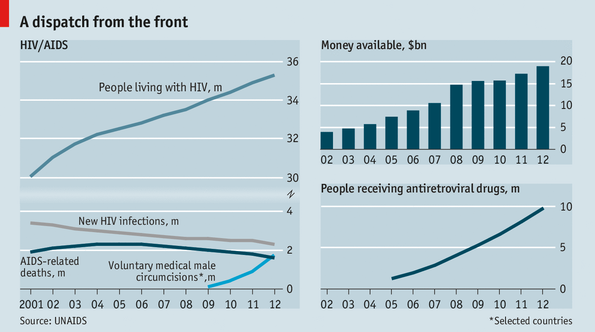I quote
the article in its entirety:
No news is often good news. AIDS has dropped out of the headlines in recent years, and that is because, in the battle between virus and people, people are winning.
This year’s report by UNAIDS, the United Nations agency charged with combating the disease, confirms that optimistic picture. Though AIDS is not beaten (it still kills 1.6m people a year), this number is down from a peak of 2.3m in 2005. And the number of new infections per year has fallen by a third, to 2.3m, since 2001. Paradoxically, the number of those infected is rising. But this is because they are living longer. These trends are mostly the result of the spread of antiretroviral drugs, which are now taken by almost 10m people. They are paid for by a rise in the money spent on AIDS in poor and middle-income countries, to $18.9 billion in 2012.
Africa’s men (and Africa is still the seat of the epidemic, with 70% of cases) have also responded enthusiastically to the discovery that circumcision vastly reduces the risk of infection. Some 1.7m a year of them are now having their foreskins snipped off in 14 countries looked at by UNAIDS.
We still don't know how to cure HIV infection. We still don't have an HIV vaccine. The reason the prevalence is going up is because more people are being infected with HIV each year than are dying with their HIV infection. 35 million infected people, 10 million dependent on expensive drugs for the rest of their lives for survival, and almost two million new infections a year doesn't sound like good news to me!

No comments:
Post a Comment